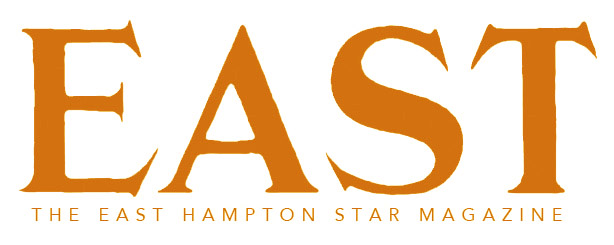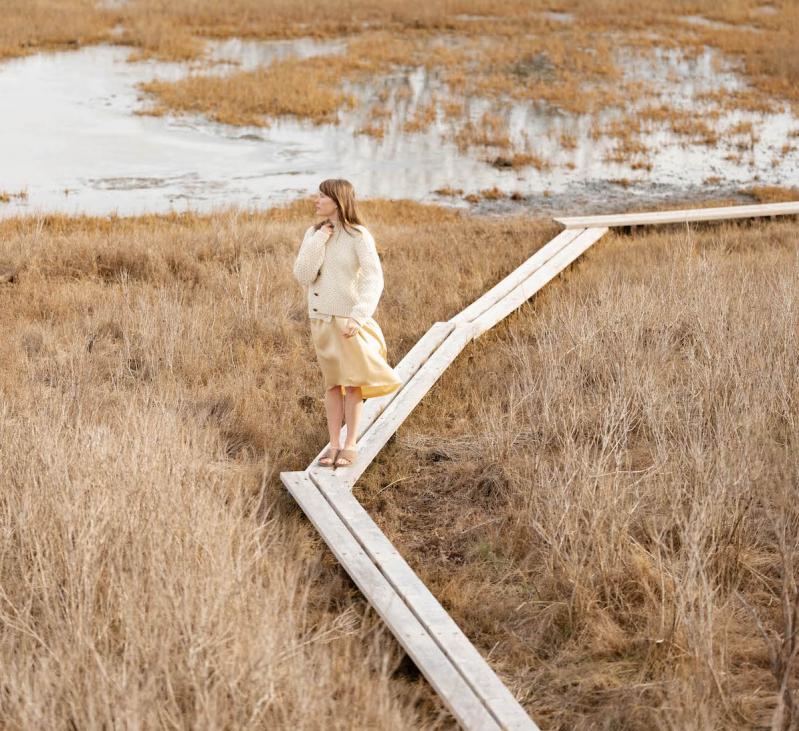Here on the East End, climate change is something we all feel keenly, and many of us are wondering what we personally — and as part of the workforce — can do about it. Nicole Delma, the owner of the lifestyle boutique and creative-craft haven Mind Offline in Sag Harbor, has long been aware that the fashion industry is a major culprit in overall waste of resources. She used to work in corporate fashion and she’s not only passionate about her shop’s environmental footprint, but also mindful of the farmers and craftspeople she enlists to help her keep that footprint small and sustainable (as well as making sure they are paid a fair wage).
“There is so much fiber waste on Long Island,” Delma says, laying out three gorgeous hand-knit sweaters made from sheep raised humanely in Mattituck. She notes that sheep, goats, alpaca and other fiber-source animals kept in petting zoos for pleasure have valuable fleece that is often just sheared and dumped.
Mind Offline has a wide assortment of clothing, crafts, and yarn for knitting, as well as a soothing and welcoming atmosphere in this online-heavy world we live in. Recently, the shop embarked on a journey to produce yarns and hand-knit garments in the most close-looped, eco-
The intention from the start was to work with a handful of nearby fiber producers and release small collections that highlight the unique qualities of each particular fiber. Delma sought out experts at Parsons School of Design to guide her.
“I adore natural dyeing, too, and that’s also part of the local wool story,” she says, describing how she and her crew dye wool and fabric using botanicals in a clawfoot tub at the shop. “But the wool itself is so important to our fiber education. It’s a huge blind spot out here.”
She loves to meet farmers who focus on climate-appropriate breeds that will remain healthy and survive happily in the New England climate; that approach also supports biodiversity at the micro and macro levels. “The local production loop is more sustainable because we can work with growers who are committed to responsible, ethical farming practices that prioritize animal welfare and contribute to soil health.”
The textile industry often uses materials (cashmere from northern India, for instance, or merino from New Zealand) that are shipped from one destination to the next throughout the process of transforming raw fibers into yarn, then dyeing and finishing the fiber into garments. By keeping the travel radius of the fiber down and coordinating to minimize driving, Local Wool Co. dramatically reduces the fuel and packaging waste. The local fiber process doesn’t involve plastic bags or excess packaging materials, either, as Delma is able to pick up the raw and finished goods herself.
Browder’s Birds in Mattituck, owned by Holly and Chris Browder, is currently ground zero for much of Local Wool Co.’s source material. Holly breeds Cotswold sheep — native to southwest England, a climate similar to ours — whose fleece is long, thick, and the naturally creamy color one associates with Welsh or Shetland sweaters. The raw Cotswold fiber is milled into a custom Aran weight yarn (they call it Nicole’s yarn, after Delma) at Battenkill Fibers in Battenkill, New York. Then, the yarn is knit into finished sweaters by a collective of knitters in Brooklyn, Queens, and Long Island.
Mind Offline also orders 250 skeins at a time — to reduce the fuel waste of multiple shipments — of the softest merino wool, grown by a shepherd named Dominique Herman in the Catskills town of Warwick, New York. A limited run of pale-pastel merino crewneck sweaters (dyed with all-natural botanical brews in the trusty bathtub in hues of rose, cornflower-blue, and butter-yellow) are on offer for late summer, before the shop transitions both its Cotswold and merino lines into more autumnal colors.
Each sweater design is named for someone special in Delma’s life: the Georgica, for her daughter, for instance. Isabella Rossellini, the actress and activist, keeps a farm herself just a little further west of the Hamptons, and — being environmentally conscious and curious to check out what’s happening at Mind Offline — stopped by the store. She fell in love with a new design; thus, it was christened the Isabella. These very unique cardigans, mock-necks, and crewnecks are available at the boutique, which is at 112 Hampton Street in Sag Harbor — and if you pre-order, they can be knit to measure.

